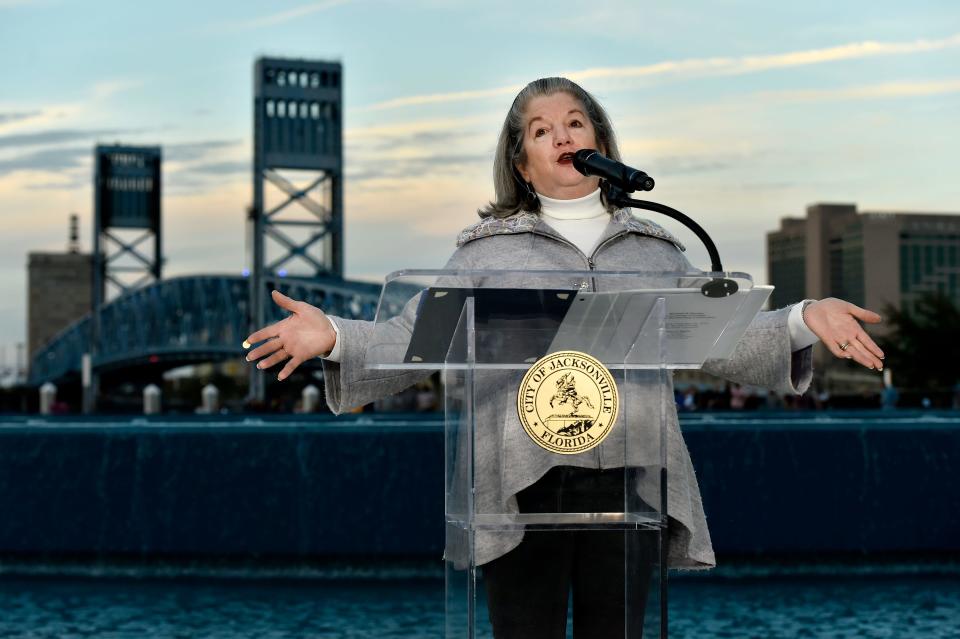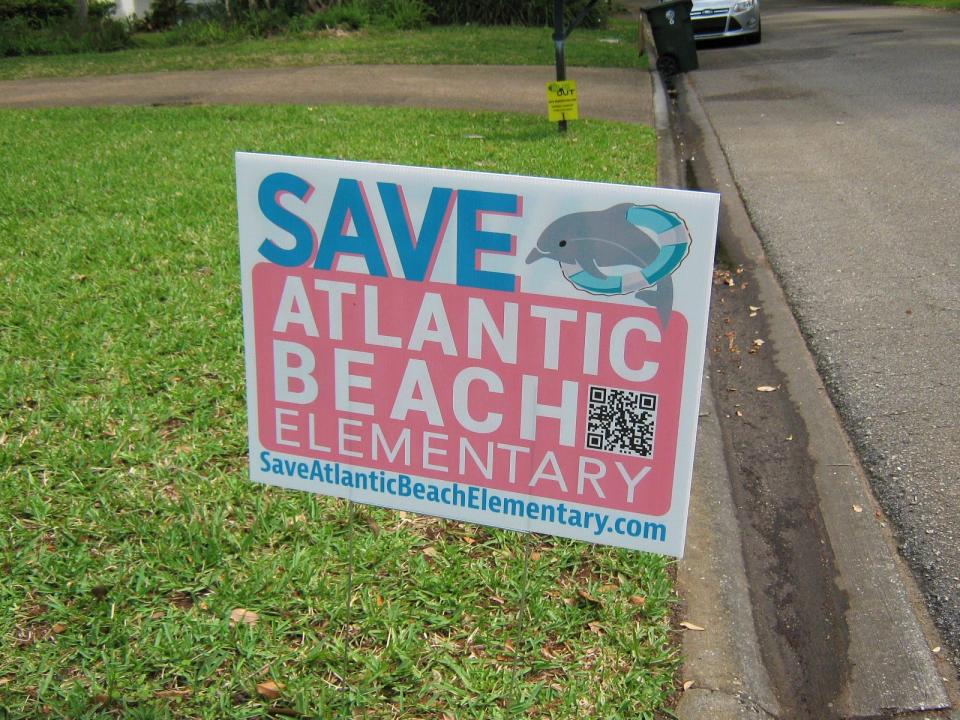Letters: Proposed titanium mine near Georgia wildlife refuge will affect Northeast Florida

The proposed titanium mine at Trail Ridge, an ancient sand dune that forms part of the eastern boundary of Okefenokee Wildlife Refuge, will significantly impact the groundwater that feeds the swamp. It will also remove more than 1 million gallons of water per day from the swamp.
This means putting both the wildlife and the swamp itself — a national ecological treasure — in peril. Keeping the waters of the Okefenokee, North America’s largest blackwater swamp and one of the largest carbon sinks in the country, in pristine condition for generations to come, is critical not only to Georgia but to Florida.
Beyond that, putting a mine at Trail Ridge will eliminate a primary entrance to the Okefenokee for canoers, kayakers, birders and other tourists, all of whom will be significantly impacted by compromising its water level and quality. Maintaining the Okefenokee’s water at optimum levels is also critical for wildfire prevention and containment.
The Okefenokee Swamp provides the headwaters for the St. Mary’s River, which serves as the border between Florida and Georgia for 130 miles, before emptying into the Atlantic Ocean at Fernandina Beach. The added contaminants discharged into the St. Mary’s and its watershed will be intolerable to the livelihood of people and businesses along the river in both states.
Given the Okefenokee’s ecological significance, the threat to the swamp should be of concern not only to anyone who lives in Georgia and in Florida but to anyone who cares about America’s environmental future. The proposed mine at the Okefenokee poses far too great a risk to one of our most unique and irreplaceable natural resources.
Concerned people from all over the country and the world are writing Georgia Gov. Brian Kemp to stop the proposed titanium mine from going forward. Send letters by U.S. Mail to The Georgia Governor’s Office, 202 Washington St., Atlanta, GA 30334 or via email at Georgia.Governor@gov.state.ga.us.
Susan Smathers, Jacksonville
Time to end spanking in schools

A Florida high school senior recently made headlines for calling attention to corporal punishment in schools after she was paddled by two male school administrators alone in an office. As of February 2024, corporal punishment in public schools is permitted by law in 18 states, including Florida.
Corporal punishment is defined as using physical force to inflict pain or discomfort as a form of discipline. In schools this most often translates to spanking or paddling. Our public schools are intended to be safe spaces for children to learn, and corporal punishment is a gross violation of a child’s right to be protected from all forms of physical and mental violence.
Simply put, physical punishments do not work. This fact is supported by numerous studies including one that revealed that children who are spanked are more likely to misbehave in the future, leading to additional punishment. Physical punishment leads to more aggressive behaviors in children and fosters a mindset that it is acceptable to hurt others.
It also has a significant negative impact on mental health including increased risk of depression, low self-esteem and suicide. In addition, corporal punishment promotes racism and discrimination, as Black students and students with disabilities are disproportionately subjected to physical punishment in schools.
The American Academy of Pediatrics policy statement recommends that corporal punishment in all school settings be “abolished in all states by law and that alternative age-appropriate and nonviolent forms of student behavior management be used.”
Duval County banned corporal punishment in public schools in 2005. Physicians, parents and educators alike should condemn this form of discipline and advocate for Florida to follow the example of Duval County: Ban the use of corporal punishment statewide in all public schools.
Taylor Smith, DO, pediatric resident physician, Jacksonville
Boyer doesn’t deserve Monroe’s criticism

I have a lot of respect for Nate Monroe’s work with the Times-Union. However, his April 11 column, with its negative criticism of Downtown Investment Authority CEO Lori Boyer, is out of line and unproductive for the ongoing revitalization of Downtown Jacksonville.
Instead of being overly critical regarding the status of current downtown development, due to several projects being delayed or reworked, let's focus on the overall body of work that has been accomplished over the last five years under Boyer’s leadership.
The current situation downtown is a combination of unprecedented rising construction and labor costs, interest rate increases, decreased available capital funds and an overall cooling off of the Central Business District. Boyer just happened to be steering the ship during this time and, in my opinion, has performed admirably considering the challenges in her path.
Eight strategic development areas form our downtown development efforts including the City Center, Brooklyn, LaVilla, North Core, Cathedral Hill, Sports & Entertainment, Working Waterfront and the Southbank. I count at least 70 projects (private and public) that are under the DIA’s control and responsibility.
This is a daunting task for anyone and from my vantage point, the agency under Boyer’s leadership has performed very effectively.
We should not change leadership at this critical time in the life of our downtown. Boyer’s institutional knowledge is most important and very valuable going forward in this difficult timeframe.
Ron Moody, MAI, SRA, past chair and seven-year board member of the Downtown Investment Authority
Fighting not always the answer

We have two Americas — one is reactive and one more proactive. One is ready to fight and go to war to relieve our fears or melt our anger. The other also labors to defend and protect us, but thinks things through before acting.
My father, a criminal defense attorney here in Jacksonville, used to say, "Son, there are times when a man is a real man; not when he fights all the time, but when he has the wisdom to know when and how to walk away from a fight."
Yes, President Joe Biden “walked away” from invading Iran. A great deal of solid thinking and cooperation undoubtedly went into this decision.
I am a fourth-generation Floridian. As election time approaches, all I am asking our residents is: Who do you feel might keep you the safest? Who do you think might avoid being the source of negative national entertainment? Who has sapped the time and attention of our House of Representatives the past four years and prevented it from working on improving a better life of all of us?
Which candidate is more "I" centered or more "All of us" centered? I know who I think has what it takes to make us far safer.
Rev. Dr. James (Jim) Black, Jacksonville
Closed Sun-Ray means 'cinema desert’

It was with great dismay that I read the April 16 article about the sale of the building currently housing Sun-Ray Cinema and the possible tragedy it portends for what remains of Jacksonville’s film culture. As local cinephiles know, Jacksonville provided a home to film production in the pre-Hollywood era, including early African American film.
After the closure of the San Marco Theater in 2022, Sun-Ray Cinema is one of the few remaining places to carry on this legacy. Even apart from the historical importance of the building itself, Sun-Ray provides a vital space for the kinds of films that our multiplexes simply won’t touch.
Soon after I moved to Jacksonville in 2019, I had the pleasure of seeing the brilliant seven-hour Hungarian epic “Sátántangó” at Sun-Ray, and yesterday I saw George Romero’s zombie masterpiece “Dawn of the Dead” there. Both films, incidentally, are about the breakdown of communities and the dissolution of culture, perhaps suggesting what awaits us in a post-Sun-Ray Jacksonville.
Indeed, if Sun-Ray closes, Jacksonville will become a cinema desert. Without the repertory, arthouse and cult film screenings it routinely offers, we will be left with only bland blockbusters and cookie-cutter multiplexes.
Derrick King, Jacksonville
Cherry-picking Bible verses
Religious faith is rooted in holy texts, while theology can influence values and politics. Opposition to women’s reproductive rights is often driven by interpreting biblical verses about pregnancies as proof that life begins at conception.
In contrast, Genesis 2:7 describes the creation of Adam: “Then the Lord God formed a man from the dust of the ground and breathed into his nostrils the breath of life, and the man became a living being.”
This passage makes an explicit statement that human life begins when the first breath is drawn. Yet I have never seen this passage included with the more metaphorical biblical references cited by anti-abortion advocates.
Many will continue to take the language of their faith to support their beliefs in fetal life. That is their right. Others, whose lives are guided by different faiths, or by no religious faith at all, may interpret the beginning of life differently. That is their right.
The First Amendment prohibits governmental interference with religious beliefs, but imposing views that strip others of their autonomy is not a right.
Stephen Entman, Jacksonville
Your mother was pro-life
In the April 14 edition of The Florida-Times Union was a guest column by Bob Bevans-Kerr, who infers that the Catholic Church relies on the law to “save Floridians from themselves and from one another.” I am sure the law that Mr. Bevans-Kerr refers to is what the laws in Florida restrict on abortions.
He calls this a “monumental moment of blindness” and claims the law stops individuals from using their own gifts of “informed conscience.” It’s my opinion that removing abortion restrictions actually degrades one’s conscience.
These are human beings in their mother’s womb who have been given by God. They are affirmed in our constitution to have inalienable rights to life, liberty and the pursuit of happiness.
I suggest that Mr. Bevans-Kerr, and all pro-abortion advocates should think back to the time they were in their mother’s womb and give thanks that she was pro-life.
Ted St. Martin, Jacksonville
Nate nailed it (again)

When I moved to Jacksonville about 60 years ago, it was considered the No. 2 city in Florida, second only to Miami. What happened? Downtown has been in a downward trend ever since.
We have been dismayed by the many industries that have pulled out due to obsolescence, market decline or investments in other geographical areas. Many businesses have simply shuttered when it became obvious they should just take the money and run.
When this starts to happen it is incumbent upon city governments (and development authorities) to take whatever action necessary to staunch the flow. Deals need to be made and do-gooders who want to keep the status quo need to be silenced. Remember the river dredging controversy? That endangered our most valuable asset — the port.
Kudos to Nate Monroe for continuing to point this out again and again.
Nancy Labry, Orange Park
No more renderings
Nate Monroe’s April 11 column was the best article on our downtown woes I’ve read in 16 years. He described what I’ve professed in dozens of letters for almost two decades about why our urban core is a lost cause.
Our downtown is completely lifeless; we are in dire need of new eyes and talent to turn the corner and start moving forward. People will probably vomit if they see yet another artist rendering of the renewed Laura Street Trio. I think that most would prefer to see those real estate vampires demolished and something viable built that people would want to call home.
As I’ve said, most city identities are validated by their urban core, and Jacksonville doesn’t have one. We won’t in the foreseeable future unless changes are made, and soon. Thanks, Times-Union — you nailed it.
Paul Poidomani, Riverside
Lying in bed made by school choice

Yards are blooming all over the neighborhood with “Save Atlantic Beach Elementary School” and “Save Seabreeze Elementary School.” It’s all too little, too late, however.
Parents have already chosen to close these public schools by removing their children from them in favor of the do-it-yourself curricula and unaccountable finances of charter schools. They ignore the fact that free enterprise often turns into fraud enterprise. Note that the latest reading and math progress reports show charter schools as a group toward the bottom of the achievement list.
The situation is not improved by parents whose lack of dedication to education accounts for the nearly 20% student absentee rates noted in some places across the country. The School Board is merely ratifying the choices parents have already made.
Sharon Scholl, Atlantic Beach
Monroe’s right, but needs maturity
Even when Nate Monroe is right on the money — in his April 7 column, for example, describing the delicacy the state uses with charter and private schools verse the cudgel they use on public schools — he’s also horribly wrong.
Maybe it’s his frustration boiling over because he lives in a place he apparently loathes. But his weekly diatribes have become so snarky and disdainful of half the citizens of Jacksonville (and Times-Union subscribers) that whatever message he’s trying to convey gets lost.
I get that he’s an opinion columnist, but at some point he needs a little maturity to take hold — or have an editor do it.
Mike Disch, Neptune Beach
This article originally appeared on Florida Times-Union: Water quality, wildlife and more at risk from proposed Georgia mine

